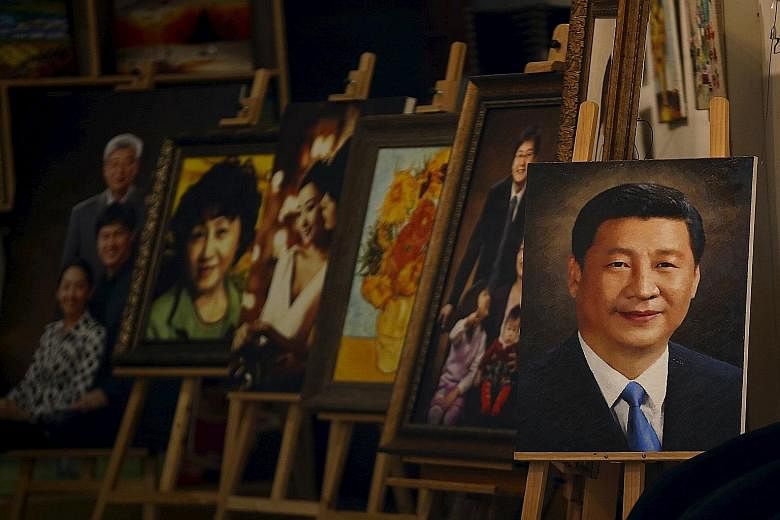President Xi Jinping likes conferences. It is estimated that he leads one, big or small, every seven days.
He has resuscitated conferences dormant for decades and started new ones. The first conference of trade unions and other "mass organisations" was held last week.
But these are not mere bureaucratic procedures. Mr Xi's penchant for meetings underscores his belief that they are useful and symbolic tools to strengthen the Communist Party's position, analysts told The Straits Times.
He has revived a military political meeting and an ethnic work conference that last took place in 1999, as well as a conference for artists not held since 1942, among others.
Experts say the conferences are part of a larger, systematic effort to re-establish the party's control over China's vast network of official bodies and organisations, which Mr Xi feels has been slipping.
His efforts also set him apart from his predecessors Hu Jintao and Jiang Zemin.
"Under the collective leadership in the past, such responsibilities are farmed out to other leaders, but Mr Xi has shown he wants to bring his prestige to every sphere," said Dr Yang Dali, director of the University of Chicago Centre in Beijing.
"It works because when you have the top leader attending a national conference, it gets taken very seriously by the participants."
At last week's conference of mass organisations, Mr Xi told the groups that they should mobilise citizens to "closely unite around" the Communist Party.
He explained the party was holding such a conference for the first time because it wanted to address problems, warning that there was a risk of these organisations being "alienated from the people".
These statements come amid concern from Mr Xi that the party was losing its relevance to the people. He has already begun an unprecedented clampdown on corruption, which he identified as a major source of disconnect.
The ethnic work conference held last October, the first in 15 years, was also seen as a way to connect with China's minorities. The Chinese social fabric has been fraying along ethnic and religious lines.
"Mr Xi wants the party to establish control and be at the centre of the country, to show that its presence is key to the running of China," said Dr Xu Yaotong from the Chinese Academy of Governance.
Another important reason for holding these conferences is the symbolism that they hold.
Last October, at a conference for China's cultural elite, Mr Xi warned the gathering of famous Chinese artists, authors, filmmakers and theatre practitioners that art should "embody socialist core values" and "rally Chinese strength".
The following month, he held a military political work conference in Gutian in coastal Fujian, where he stressed to participants that "the party commands the gun", referring to the Communist Party's control over the People's Liberation Army (PLA).
The two conferences are significant in that they harked back to landmark conferences under founding Communist leader Mao Zedong, analysts say.
The conference for the artists was last held in 1942.
Intellectuals were told at the time to toe the party line and also that art must work for ideological and political goals.
Similarly, the Gutian conference was first held in 1929, when the party established control over the PLA.
Following the latest meeting and statements made in Gutian last year, the authorities began a crackdown on corrupt military leaders that has continued till today.
These new meetings serve as a rallying point for party cadres and underscore Mr Xi's belief that upholding party traditions is crucial for the Communist Party's survival, as well as for warding off the infiltration of Western ideals.
"Xi is big on party traditions, feeling that the Soviet Union collapsed because its leaders abandoned its Communist roots," noted Dr Willy Lam from the Chinese University of Hong Kong.
"Reviving historical conferences remind officials and younger Chinese about history and the central role the Communist Party played."
Such meetings are likely to continue given Mr Xi's conviction. The concern, however, is whether they risk alienating other segments.
"There's some value in reviving traditions and Mao-style orthodoxy to rally party cadres," said Dr Lam. "The risk is whether they will turn off intellectuals or younger people."


